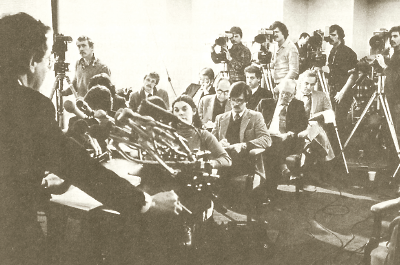The jury’s verdict in the John Hinckley case in 1982 set off a national firestorm about the insanity defense.
Hinckley shot and wounded President Ronald Reagan and three other people in Washington, D.C., in March 1981. At his 1982 trial, the jury returned a verdict of not guilty by reason of insanity.
“There was a huge backlash in this country in the wake of that verdict,” recalled Paul S. Appelbaum, M.D., the Dollard Professor of Psychiatry, Medicine, and Law and director of the Division of Law, Ethics, and Psychiatry at Columbia University College of Physicians and Surgeons. “People thought he had ‘gotten off,’ that it was a travesty of justice.”
After the Hinckley trial, many called for abolition of the insanity defense or at least severe restrictions on its scope. The AMA, for instance, “advocated laws permitting a defendant’s mental disorder to be an issue at trial only if he was not capable of having intent, or mens rea, to commit the crime,” wrote Psychiatric News on January 6, 1984.
“The AMA’s position arose partly because of a desire to protect the medical profession from the sight of unseemly ‘battles of the experts,’ such as occurred at Hinckley’s trial,” said Appelbaum.
The uproar was widespread, but the problem was less a failure on the part of the jury than flaws in the existing law, according to Richard Bonnie, J.D., a professor of medicine and law and director of the Institute of Law, Psychiatry, and Public Policy at the University of Virginia, in a recent interview.
Dissatisfaction with the insanity defense had been rising before the Hinckley case, said Bonnie. The MacArthur Foundation had spent millions on research to create new criminal justice mental health standards.
In response, APA appointed a task force headed by Loren Roth, M.D., now an associate senior vice chancellor, health sciences, for clinical policy and planning at the University of Pittsburgh. The group spent months working out a version of the insanity defense that would retain its basic principle—that persons with some mental illnesses had some diminished responsibility for their actions.
Roth went in person to an AMA meeting to debate the idea, arguing that it was a necessary and proper part of the law to preserve the rights of people under certain circumstances.
The existing standard applied in the Hinckley trial included two parts derived from the Model Penal Code developed in the 1950s and 1960s—a cognitive and a volitional component.
“The cognitive element focused on whether the defendant lacked substantial capacity to appreciate the wrongfulness of his actions,” explained Bonnie. He helped craft the APA statement, which was coordinated with one put forth by the American Bar Association (ABA). “The volitional prong concerned a lack of capacity to conform to the requirements of the law.”
In addition, the Model Penal Code said while the defense could assert that the defendant was insane at the time of the crime, the burden of proof ultimately fell on the prosecution to show that the defendant was not insane.
This inevitably led to each side bringing in its own psychiatric experts to contest its opponent’s findings and conclusions.
Finally, at a news conference in Washington, D.C., on January 19, 1983, APA presented its proposal to modify the insanity defense.
The statement called for “a tightened insanity plea for severely mentally ill, violent offenders and the formation of ‘parole-type’ boards to monitor the treatment and release of insanity acquittees,” reported Psychiatric News in its February 4, 1983, issue. “The insanity defense should be retained in some form … because it is based on the traditional provision of criminal law ‘that punishment for wrongful deeds should be predicated upon moral culpability.’ ”
“But,” said Appelbaum, “APA and the ABA agreed on a compromise position that maintained the longstanding logic behind the insanity defense that differentiated between behavior driven by mental illness versus and an intrinsic desire to harm.”
The APA-ABA statements also called for a shift in the burden of proof from the prosecution to the defense.
“The statement was clearly designed to preserve the insanity defense for the good of society and of mentally ill persons at a time when it was being criticized, and it was successful in doing that,” said Roth.
Would Hinckley have been convicted if the law had been changed before his trial?
“I don’t think it would have made any difference,” said Bonnie. “The jury believed the defense and just didn’t buy the prosecution’s case.”
Ironically, the insanity defense is raised much less often than people think, said Bonnie. “It is used in less than 1 percent of felony cases, and if the experts disagree, the defense loses 75 percent of the time.”
There was more to the battle over the insanity defense than a change in the law, Appelbaum believes.
“The process demonstrated the value of having an organization to speak for psychiatry at the national level,” he said. “APA played a role in holding back demands for unreasonable change while still allowing for public safety.” ■
APA’s current position statement on the insanity defense can be accessed
here.


